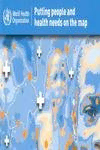
Putting People and Health Needs on the Map PDF
62 Pages·2007·5.993 MB·English
Most books are stored in the elastic cloud where traffic is expensive. For this reason, we have a limit on daily download.
Preview Putting People and Health Needs on the Map
Description:
The launch by WHO of an innovative public health mapping programme which promotes the use of computerized Geographical Information Systems (GIS) to improve disease surveillance is transforming the way geographically linked information can be used to monitor disease improve health care and save lives. This publication shows how health mapping is being used by decision-makers to identify populations at risk assess health care coverage guide health sector strengthening highlight the geographical spread of diseases and stratify risk factors. It also helps assess resource allocation plan and target interventions support the monitoring and analysis of trends and support advocacy and fundraising. Part 1 highlights some of the ways in which health mapping and GIS are being used both in countries and at the global level to inform decision-making and improve health care. Part 2 looks at how public health mapping and GIS are being used across the board to support global efforts to roll back malaria. Part 3 examines how public health mapping and GIS are poised to become cutting-edge tools for disease surveillance and global health security in the 21st century.
See more
The list of books you might like
Most books are stored in the elastic cloud where traffic is expensive. For this reason, we have a limit on daily download.
